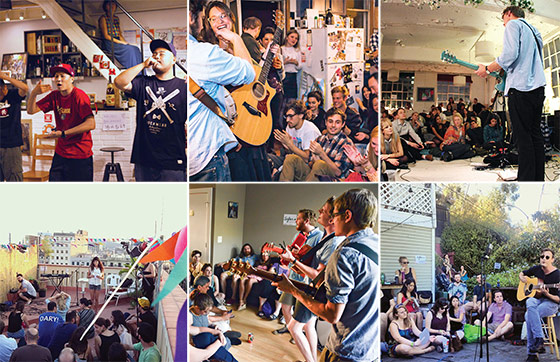
Founded: 2009
Private concerts every day: 1
Ratio of applicants to guests: 8:1
Lesson: Tiny can be big.
Sofar’s “secret” gigs take place in over 50 cities worldwide, in at least one living room every day—a carefully curated musical showcase whose program and exact location remain undisclosed to attendees until the day of the event. That night, buzzing strangers crowd a willing volunteer’s apartment and are instructed to sit quietly, resist their smartphones, and stay for the evening. (The name is short for “songs from a room.”)
At the local level, these living-room concerts are organized by volunteers like Jodie Belman, Sofar’s New York director, who selects acts—“I think I have good ears,” she says, especially for acts that’ll play well in an intimate, acoustic setting—and scouts locations. Twice a month, 100 to 130 New Yorkers, hand-selected from a waiting list of nearly 800 hopefuls, receive the coveted e-mail with show details. All the proceeds from a pass-around-the-bucket $10 suggested donation go toward musician travel and a videographer stipend.
But Sofar isn’t a just-cover-the-overhead operation anymore. Over the last year, the company has attracted $200,000 in angel investments, mostly from music-industry players who describe the organization as “a new platform for artist discovery”—i.e., a way for them to scout talent. And the company is currently experimenting with four possible revenue streams, each of which involves acting as a sort of broker for Sofar acts: licensing music for ads, films, and TV shows; forging partnerships with music-discovery and distribution services like Shazam, Soundhalo, and Spotify; staging larger ticketed concerts branded Sofar Plus; and producing compilation albums of select Sofar artists.
When he first began hosting London gigs in 2009 to help his musician friends, Sofar’s co-founder Rafe Offer had never intended to seriously scale or monetize the project. “We wouldn’t announce who was playing, and yet people kept coming,” says Offer, who came to Sofar after working in marketing for Disney and Coca-Cola. “I guess the best corollary is electronic music. People go to EDM not necessarily caring who’s performing, but more because it’s a good experience.”
“My fear about putting money behind this is that it will start to lose its magic,” says Belman, whose day job is doing trend consultation at ESP Trendlab. “What’s interesting, and has started to happen in the last couple of years because the economy has been so bad, is people are trying to find comfort in things that don’t involve money. People are trying to find ways that are a bit more sentimental and have things that are more spiritual and down to Earth.”
“I guess I’d call it a sweet spot,” says Offer. “Keeping it ‘free’ for the smaller events, letting people hear new music, not caring if somebody is popular, only caring if their music is good. And, at the same time, finding ways and partners who can distribute it, so that it gets heard and there is a business element to it.”